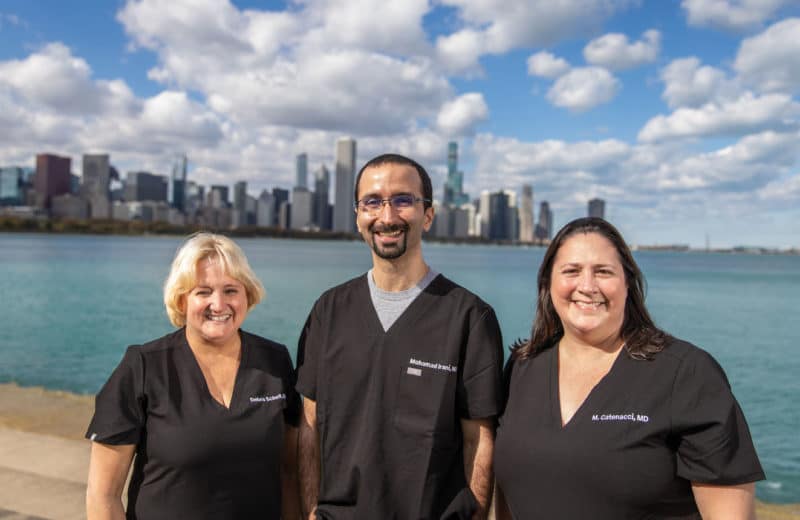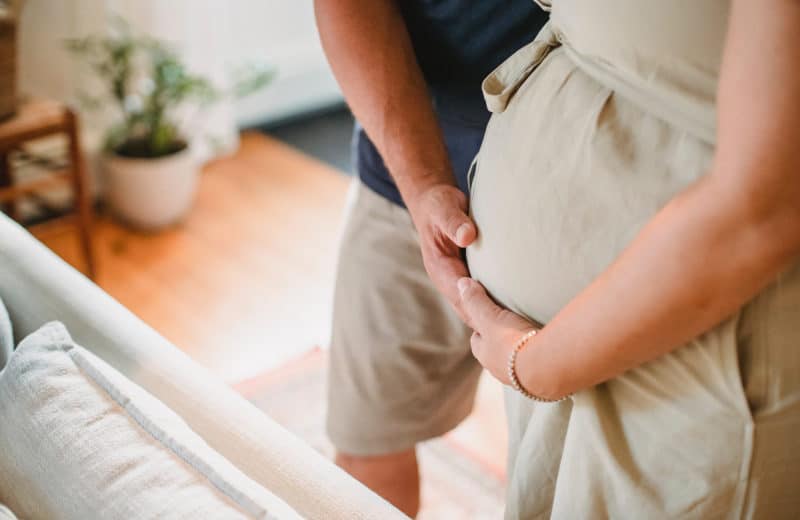Opening up fertility conversations in the gender-diverse community
Nestled in their Logan Square living room, Wil (pronouns: they/them/theirs), age 22, confides that they’ve always known they would raise children.
It was the day before Wil would visit their physician at a Chicagoland clinic specializing in the LGBTQIA+ community to discuss fertility. It’s a topic Wil thinks about a fair bit, as they recently started “T” (weekly testosterone injections) and plan to have surgery within the next year to remove their breast tissue and masculinize their chest.
As someone AFAB (assigned female at birth), Wil is coming to terms with how physical changes to confirm their gender identity will affect their future as a parent.
“That’s the biggest thing I’ve been thinking about with top surgery,” Wil says. “That I wouldn’t be able to breastfeed.” When it comes to pregnancy itself, however, Wil hasn’t thought much about the medical machinations that would be involved in becoming a biological parent someday.
Gender-affirming hormone treatment and surgery can potentially result in infertility, so some gender-diverse individuals need to preserve fertility — including sperm banking and egg freezing — before physically transitioning. Long-term effects of gender-affirming hormones on future fertility are unclear, which means that Wil and others have to think about fertility alongside their identity.
Luckily, the medical community is moving to incorporate fertility preservation conversations early on with patients.
“When I first started T, my doctor asked if I thought I’d want to be pregnant someday,” Wil says. “Part of me felt like I had to follow a trans narrative and say ‘no,’ that I couldn’t possibly want to be pregnant someday because I was there asking for T. If I said ‘yes,’ I was afraid it would make me seem less credible.”
Starting the conversation
Wil isn’t the only individual in the gender-diverse community who struggles with the topic of fertility.
Once a patient has expressed a desire for gender-affirming medical or surgical treatment that can impact fertility, the goal is to broach the fertility conversation as soon as possible, says Diane Chen, PhD, behavioral health director for the Potocsnak Family Division of Adolescent and Young Adult Medicine and pediatric psychologist within the Gender and Sex Development Program at the Ann & Robert H. Lurie Children’s Hospital of Chicago.
“When we first started our gender program, we had patients and their parents asking how long-term hormone use affected fertility,” Chen says. “Every patient’s journey is different, but as our program has grown, we try to integrate those fertility conversations earlier and earlier to give youth time to consider their options.”
Our patients can now live in physical alignment with their identities and still maintain their reproductive capabilities. Gender-confirming surgery doesn’t exclude the possibility of having a family.
It’s a hard conversation to have with a teenager or young adult, Chen says. “Most of the reproductive health discussions with patients that age are about safe sex and contraception,” she says. “But now, we’re asking patients to think long-term. It’s not developmentally normative. They don’t just sit around and think about whether they want to be parents someday and, if so, how important it is to have genetically related children.”
Fertility preservation measures (especially egg freezing), while on-trend in the cisgender world, are newer conversations for those across the gender spectrum. This disconnect in the fertility conversation leaves people like Wil feeling they should know more than they do and perhaps afraid to inquire.
“I felt like I was expected to know those answers already.
I didn’t want to out myself for being less educated,” Wil says. “But there’s part of me that’s embarrassed to talk about fertility because I feel embarrassed talking about womanhood.” Even when someone on Wil’s journey broaches those complex conversations, there are many factors at play.
While the technologies for fertility preservation are vast, high costs and complexities often make it inaccessible. For eggs,an AFAB patient is looking at a hormone stimulation and surgicalretrieval process, along with ongoing storage fees at a cryobank. A full cycle can cost $5,000 or more, making it financially out of reach for many. AMAB (assigned male at birth) patients can masturbate to collect sperm, but they have other fees including collection costs and infectious disease testing at around $1,000 and recurring cryobank fees of about $400 per year.
These costs can complicate gender confirmation journeys, as often decisions come down to which steps will provide a patient with the greatest level of physical and aesthetic comfort moving through the world. Many choose to focus their financial resources on physical gender-confirmation procedures. And whereas gender confirmation procedures are often covered by private insurance or Medicaid, fertility preservation is typically not.
Individuals now have more options than to solely confirm their physical gender identity, says Loren Schechter, MD, director of the Center for Gender Confirmation Surgery at Weiss Memorial Hospital and clinical professor of surgery at the University of Illinois at Chicago.
“Our patients can now live in physical alignment with their identities and still maintain their reproductive capabilities,” Schechter says. “Gender-confirming surgery doesn’t exclude the possibility of having a family.”
Trusting the process
Wil brought a handwritten list of questions to their doctor appointment and asked about pregnancy, the effects T might have on their ovaries, the costs of egg harvesting and whether the effects of T are reversible if they later decide they want to become pregnant.
Wil left the appointment not just empowered, but with a new resource: a referral to support groups. Wil realized that they need more support as they go through this journey to find their best, whole self. The possibility to talk to others on similar gender identity journeys gave Wil a new sense of strength and a reminder that it’s okay to ask for help during a stressful time.
And while Wil isn’t expecting to have a baby or become a parent for at least another seven to 10 years, they do have a better understanding of their body, the science and the options available for someone who’s gender-diverse.
“I left feeling like when I’m ready to have a kid, I can have a conversation with my doctor and figure it out just like anyone else,” Wil says.
And isn’t that what everyone on the fertility or parenthood journey does each day? Indeed — they consult the growing number of resources available and work together to figure it out.





